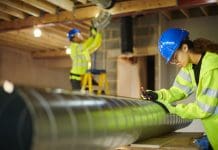IC3, the International Centre for Connected Construction, is breaking down silos and driving change in the built environment and across the construction ecosystem through innovation and evidence-led collaborative research
If asked about your contribution to industry research and learning, what would be your answer? The private sector is seemingly reluctant to engage on a larger scale in research, despite the government’s industrial strategy calling for efficiencies of up to 40% and the increasing benefits that digital technologies can bring. Is this another example of short-termism? Do the benefits of research take too long to realise? How do you encourage investment this year that might not pay off for several more?
What’s in a name? Terms like ‘research’ and ‘innovation’ can often put companies off. Too often, it’s something for others to do, and staying on top of the latest trade research is unlikely to be on many quarterly targets. But if ‘others’ shoulder the risks, they reap the rewards.
So let’s not get hooked up on terminologies. The simple message is everyone does research in their ordinary lives – why shouldn’t it continue through into business? Children scour Amazon, Argos and Smyths Toys for Christmas and birthday presents – that’s research. You wouldn’t buy a car without shopping around and comparing prices – that’s research. Every company, however successful, should be looking for continuous improvement. What are the leading organisations in the sector doing? What trend is next on the horizon? How are your competitors innovating?
What is IC3?
IC3 is an international centre of excellence driving positive change in the construction industry and looking to break through silos and underpin a more collaborative and holistic way of working that creates safer, improved quality and better performing built assets.
Based in North East England, IC3 emphasises the use of research and learning in all its forms to understand and harness the strength of the universities to support and improve businesses. The Research Excellence Framework (REF2021) ranks the universities of this region as hosts to the largest concentration of researchers outside London. The intention is that the construction industry benefits from this research talent through greater engagement with the universities by bringing together expertise and experience from across the construction sector to drive change.
Worthwhile research can take years to pay full dividends, but there’s no reason it can’t produce early returns too. There is increasing variety and more than just the conventional research funding from the likes of UKRI. Funded PhDs are growing in popularity, where a company can select a PhD graduate to research an area that will directly benefit their company. Knowledge Transfer Partnerships (KTPs) are even simpler and more immediate.
Examples of KTPs
One current example is a company-funded PhD on machine learning from digital twin data for better energy performance and planned maintenance. Another is a KTP to implement an early-stage digital embodied carbon assessment tool into designers’ workflows. These ideas originated in private sector companies, which saw opportunities to improve their businesses. They are good examples of companies investing in research – we just want more.
Traditionally, firms in the sector wait for others to innovate before they try for themselves. We may not be able to change that mindset completely. Still, to take advantage of research that has shown results, universities need to be able to showcase the benefits through Demonstrator Projects. This means increasing emphasis on experiential learning – work placements, degree apprenticeships and continuous professional development – and not all on a university campus.
Encouraging young people to enter the sector
Many cling most strongly to the ideas, methods and concepts they were introduced to in their formative years, and it’s necessary to square that with the conflict between classroom theory versus on-the-ground reality. We want industry heads, whether in the board room or on the building site, to listen to their bright and diverse talent, including graduates leaving university and joining their businesses.
The industry needs a workforce trained to 20th-century standards to adopt 21st-century technologies. Students should graduate with skills and knowledge of the latest techniques, processes and current and future trends. Let’s harness this knowledge and enthusiasm, and it will improve quality, efficiencies and profit.
Tom Harrison
IC3
Chair










![[VIDEO] Making DorTrak reports easy to read with Fireco Inspecting fire doors at Fireco, firedoor technology, 2023](https://www.pbctoday.co.uk/news/wp-content/uploads/2024/04/JPZ_2364-web-218x150.jpg)
![[VIDEO] Re-flow Field Management review by Traffic Management Installations When TMI began subcontracting for councils and government bodies, they wanted to present their site reporting in a more professional manner](https://www.pbctoday.co.uk/news/wp-content/uploads/2025/03/TMI-Media-1-218x150.png)


